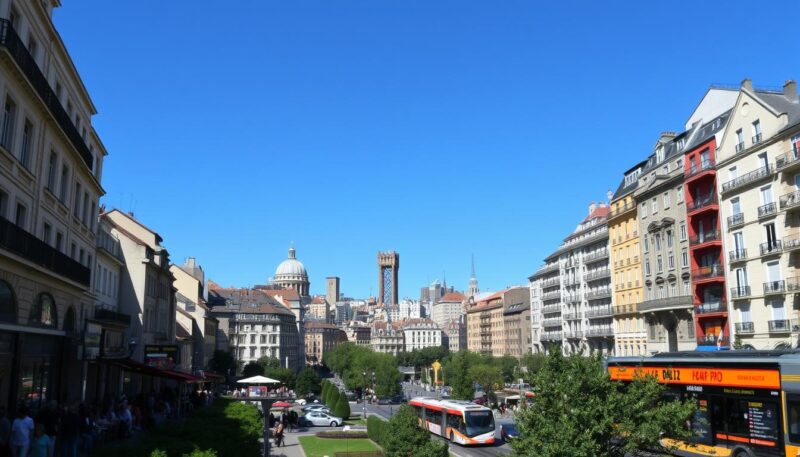As we delve into the shifting landscape of living costs across Europe heading into 2025, it’s essential to pinpoint which cities are emerging as the most expensive and how they stack up on a global scale. Recent rankings by Mercer and other prominent cost-of-living surveys reveal that cities like Zurich, London, and Dublin continue to dominate not only Europe but also feature prominently worldwide. These cities are consistently ranked high due to soaring housing costs, substantial public transportation fees, and the overall cost of goods and services.
Understanding the dynamics behind these high costs can significantly assist individuals and businesses in making well-informed decisions regarding relocation and lifestyle management. Whether you are considering moving within Europe or simply curious about Europe’s costliest cities, knowing these intricacies can guide your choices and expectations.
The Most Expensive Cities in Europe: Top Contenders
When examining the most expensive cities in Europe, several iconic locations emerge as top contenders. These cities not only offer a high-quality life but also come with substantial living costs, making them significant points of interest for expats, professionals, and global citizens. Let’s delve into what makes Zurich, Dublin, and London stand out.
Zurich, Switzerland
Regarded as one of the most expensive cities in Europe, Zurich attracts expats due to its pivotal role in global finance. The Zurich cost of living is driven by high-standard housing, gourmet food offerings, and impeccable public services. Zurich’s robust economy, combined with its scenic beauty, makes it a desirable yet expensive place to reside. Multinational companies and financial institutions dominate the landscape, contributing to the city’s premium living costs.
Dublin, Ireland
Dublin has quickly risen through the ranks, driven by a burgeoning tech industry and high demand in the rental market. The Dublin expenses have surged, particularly for digital nomads and young professionals. Known for its rich cultural heritage and vibrant social scene, Dublin’s appeal comes with a hefty price tag. The city’s impressive growth has led to increased costs across the board, making it a hot topic among the top European cities for expats.
London, United Kingdom
London’s status as a global cultural and financial hub perpetually places it among the most expensive cities in Europe. London living costs, including housing, transport, and essential services, remain high despite economic fluctuations. Offering a blend of history, modernity, and diverse opportunities, London continues to be a magnet for expats. The city’s extensive expatriate community benefits from its dynamic job market and world-class amenities, albeit at a substantial cost.
| City | Average Cost of Living (£) |
|---|---|
| Zurich | 4,300 |
| Dublin | 3,800 |
| London | 4,700 |
Factors Driving High Living Costs in Europe
As we delve into the high living costs in 2025, several compelling factors come to light. Understanding these key elements can help you navigate and anticipate the cost of living in Europe effectively.
Geopolitical Events
Geopolitical events significantly influence the economic landscape, driving up the cost of living in Europe. Conflicts such as Russia’s invasion of Ukraine have had a ripple effect, leading to inflationary pressures across multiple European nations. These events disrupt supply chains and fuel price volatility, impacting everything from groceries to fuel, ultimately escalating the high living costs in 2025.
Housing Market Dynamics
The housing market remains a pivotal factor in the cost of living in Europe. Cities like Dublin and London exemplify this dynamic, experiencing sharp fluctuations in rental prices due to limited supply and soaring demand. In Germany, households allocate over 16% of their disposable income to housing costs, while countries like Italy and Poland grapple with overcrowded conditions. These market dynamics make it essential to monitor trends as they heavily dictate housing costs in Europe.
Public Transport Fares
The expenses associated with commuting are another significant contributor to the cost of living in Europe. Cities renowned for their high public transport fares, such as Zurich and Dublin, place an additional financial burden on their residents. With public transport being a daily necessity for many, these fares exacerbate the already high living costs in 2025, making it a vital factor to consider when evaluating your expenditure.
Price Comparison: Essential Goods and Services
When considering the cost of living across Europe’s most expensive cities, it’s crucial to assess the price levels of essential goods and services. This analysis reveals striking disparities, impacting your overall expenses in these urban hubs.
Housing Costs
Housing remains the largest portion of your budget in major European metropolises. Cities like Dublin and Istanbul have seen significant increases in rental prices, leading to a decreased overall affordability. Additionally, Zurich stands out with its high housing costs, reflecting the city’s luxurious standard of living. Meanwhile, London continues to display strong upward trends in its housing market, driven by demand and limited supply.
Cost of Food
The cost of food in Europe can vary substantially. For instance, you’ll find the highest price levels for food in Luxembourg and Switzerland, where food and non-alcoholic beverages were 19% above the EU average in 2023. This, coupled with high import costs and luxurious dining preferences, escalates overall expenses. Conversely, cities in Romania and Poland offer more affordable food prices, standing 26% and 22% below the EU average respectively. Denmark and Malta also present elevated costs at 16% above the EU average, reflecting their high standards of living.
Utilities and Transportation
Utilities and transportation costs have a profound influence on the European city lifestyle. The Netherlands reported the highest price levels for electricity, gas, and other fuels among 36 countries, making utility bills a significant expenditure. Transportation costs also vary, with Iceland showing the highest price level for transport services in 2023. In comparison, Hungary remains the least expensive among EU countries for energy costs, presenting a slight relief for residents. Public transport fares in cities like London and Zurich continue to rise, adding another layer to the city’s expensive living costs.
Evaluating these essential costs can help you make informed decisions about where to live and how to manage your expenses in Europe’s priciest cities.


